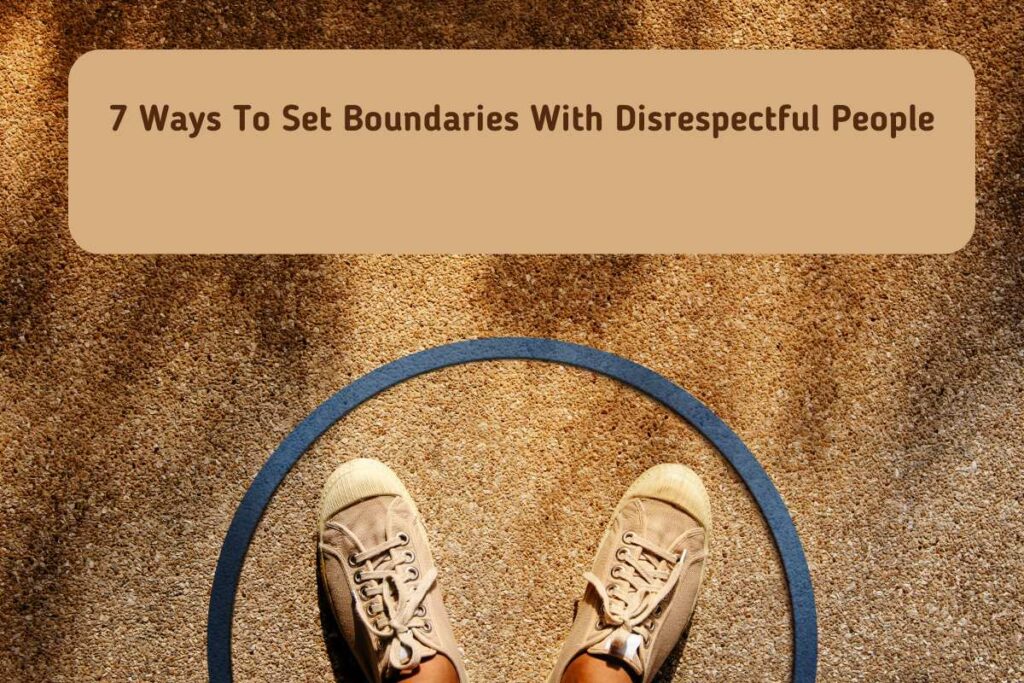Setting boundaries is crucial for maintaining mental and emotional well-being, particularly when dealing with disrespectful people. Here are seven effective strategies to help you set boundaries, even if you’re intimidated.
Learning to set boundaries is crucial for maintaining your self-esteem and self-worth. However, recognizing the signs of disrespect can sometimes be challenging. Once identified, it’s essential to assertively set boundaries to protect your mental and emotional well-being.
So how do you release the frustration and festering resentment when others have disrespected you?
There are some practical strategies to effectively set and maintain boundaries with individuals who have crossed the line or violated your dignity. These strategies can help safeguard your emotional and psychological well-being, preventing others from continually undermining your self-esteem and self-worth, while also sending a clear signal that disrespectful behaviors are unacceptable, creating a healthier environment.

Why Boundaries Matter
Boundaries act as a shield, protecting your self-esteem and personal space. They are essential for healthy relationships and ensure you remain respectful to yourself while demanding the same from others. Without boundaries, you’ll often find yourself feeling disrespected, anxious, and overwhelmed.
Here are 7 ways to set boundaries with disrespectful people:
- Communicate your limits
- Stay consistent Consistency is key in boundary-setting. Once you’ve set a boundary, adhere to it consistently. This consistency teaches others that you are serious about your limits and that these are not up for negotiation.
- Use ‘I’ statements Make it personal and less accusatory by using ‘I’ statements. For example, “I feel disrespected when my ideas are dismissed without discussion. I need my input to be considered seriously.”
- Prepare for pushback When you start setting boundaries, be prepared for some pushback. People may test your limits. Stay firm and reiterate your boundaries whenever necessary. This steadfastness can deter future disrespect.
- Reinforce positively When your boundaries are respected, acknowledge and thank the person. Positive reinforcement can encourage respectful behaviors and strengthen your relationships.
- Limit contact if necessary If someone consistently disrespects your boundaries, it may be necessary to limit your contact with them. Protecting your mental and emotional well-being sometimes means reducing or eliminating interactions with toxic individuals.
- Seek support Don’t hesitate to seek support from friends, family, or a professional counselor. Having a support system can provide validation, encouragement, and practical advice on maintaining your boundaries.
Let me Explain these 7 ways in detail so that as a reader you can understand better
1. Assertive Communication
Assertive communication is the foundation of setting boundaries. Clearly and calmly express your needs and limitations. For instance, say, “I feel uncomfortable when you speak to me in that tone. Please talk to me respectfully.” Be direct and assertive without being aggressive. For instance, if someone interrupts you, politely but firmly say, “I wasn’t finished speaking.” Clearly stating your boundaries teaches others how to treat you and signifies that you respect yourself and they should as well.
2. Setting Consequences
It’s important to outline the repercussions if your boundaries are not respected. Let the person know what will happen if they continue their disrespectful behavior. Example: “If you continue to interrupt me, I’ll have to end this conversation.”
3. Self-Awareness
Understand your limits and triggers. Self-awareness helps you identify when your boundaries are being crossed and equips you to address the situation promptly.
4. Maintaining Consistency
Once you’ve set a boundary, be consistent in enforcing it. Inconsistency can lead to confusion and disrespect from the other party. Reinforce your boundaries each time they are crossed without exception.
5. Limiting Interactions
Control the amount and nature of your interactions with disrespectful individuals. Reducing contact time can minimize the chances of boundary violations.
6. Seeking Support
Having a support system—whether friends, family, or therapists—can provide you with the strength and encouragement needed to maintain your boundaries.
7. Knowing When to Walk Away
Sometimes, discontinuing a relationship is necessary if someone consistently disrespects your boundaries. Recognize when it’s time to step away to protect your well-being.Setting boundaries with disrespectful people is a continuous process that requires patience, practice, and perseverance. By consistently implementing these strategies, you can create a space where you feel respected and valued. Here are some additional tips to help you maintain your boundaries and protect your well-being:
8. Practice self-care
Taking care of yourself is vital when dealing with disrespectful individuals. Engage in activities that help you relax and recharge, such as exercise, meditation, reading, or spending time with loved ones. Self-care can boost your resilience and help you maintain a positive mindset.
9. Educate yourself
Understanding more about boundary-setting and assertive communication can empower you to handle disrespectful behavior more effectively. There are many books, articles, and online resources that offer valuable insights and techniques for managing difficult interactions.
10 . Stay calm and composed
Maintaining your composure when confronted with disrespect can be challenging but is essential. Responding calmly and rationally, rather than reacting emotionally, can help you assert your boundaries more effectively and prevent the situation from escalating.
11. Know when to walk away
Sometimes, despite your best efforts, some people may refuse to respect your boundaries. In such cases, it’s important to recognize when it’s time to walk away from the relationship. Prioritizing your mental and emotional health means letting go of toxic relationships that consistently undermine your self-worth.
12. Reflect and learn
After each interaction where you set a boundary, take some time to reflect on what went well and what could be improved. Learning from each experience can help you refine your approach and become more adept at handling similar situations in the future.
13. Seek professional help if needed
If you find it particularly challenging to set and maintain boundaries, consider seeking help from a therapist or counselor. They can provide personalized guidance and support to help you develop the skills needed to protect your well-being.
14. Celebrate your progress
Setting boundaries is not always easy, and it’s important to acknowledge and celebrate your progress. Each step you take towards establishing and maintaining your boundaries is a victory that contributes to your overall well-being and self-respect.
By following these strategies, you can create a healthier environment where you feel respected and valued. Remember, setting boundaries is an ongoing process that requires dedication and self-awareness. With time and practice, you will become more confident in asserting your needs and protecting your self-worth.
Personal Insights and Tips
Setting boundaries is not always easy, especially if you’re naturally accommodating or have a history of being intimidated. Here are some personal insights:
- Practice Makes Perfect: The more you practice setting boundaries, the more confident you will become.
- Prepare in Advance: Plan what you will say and do in boundary-challenging situations.
- Remain Calm: Staying calm helps you communicate more effectively and stays true to your boundaries.
FAQs on Setting Boundaries
How do I know if my boundary is reasonable?
A reasonable boundary respects both your rights and the rights of others. If it helps you feel safe and respected, it’s likely reasonable.
What if the person reacts negatively?
A negative reaction is common, especially if the individual is not used to boundaries. Stand firm but remain respectful.
How can I stay consistent?
Consistency is key. Keep reminding yourself of the importance of the boundary for your well-being. Enlist the help of a trusted friend to remind you.


